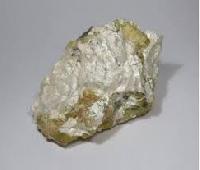
Get Price Quote
Copper Cathodes, english language training services

Calcined Bauxite Lumps
Get Price Quote
100 Ton (MOQ)
Calcined bauxite is produced by sintering high-alumina bauxite in rotary, round, or shaft kilns at high temperatures. This process increases the alumina content and improves physical properties. Specifications: Include alumina content, grain size, and other technical details.
Best Deals from Industrial Mineral

Chelated Magnesium (EDTA Mg- 6%)
Get Price Quote
100 Kilogram (MOQ)

HyfloSupercell Expanded (UP) Perlite
Get Price Quote
Expanded Perlite is an economical insulation for high and low temperature and cryogenic applications, gypsum plaster, filling, construction, building materials and many use . It is widely used because of its Low thermal conductivity Low cost Ease of handling Non combustibility Low moisture retention

Soapstone Powder
Get Price Quote
16 Ton (MOQ)
Soapstone powder is a clay mineral also knows as hydrated magnesium silicate. Also commonly known as talc powder and purified talc is a product extensively used in pharmaceutical, paper, cosmetic industry etc. Talc powder acts as a lubricant and as a filler in paper manufacturer. It is also used to make Plastic Master batch. It primarily acts as a filler in various industry ranging from paint, rubber, inks, paper etc.

Bauxite Lumps
Get Price Quote
Packaging of products is what we equally focus on. Our industry experts follow all the quality parameters while wrapping the products, we only use exceptional packaging material. As we have a wide distribution network, we are able to ensure our payment procedures are fast and simple. Additionally, we are capable of providing prompt payment discounts.

Bauxite Lumps
Get Price Quote
aluminum silicate powder, Mica Powder, calcined clay powder

Organic Turmeric Powder
Get Price Quote

Refractory Grade Calcined Bauxite
Get Price Quote
With a variety of uses of calcined bauxite, Rain Gold Group offers refractory grade material that offers high refractoriness, moderate slag resistance, good mechanical strength and many other benefits. Used in a variety of industries, the company makes sure the clients get the best out of it. APPLICATIONS "Bauxite, an aluminium ore, is the world's main source of aluminium. It consists mostly of the minerals gibbsite Al(OH)3, boehmite γ-AlO(OH) and diaspore α-AlO(OH), mixed with the two iron oxides goethite and haematite, the clay mineral kaolinite and small amounts of anatase TiO2. Calcined Bauxite is used as raw material for manufacturing fused alumina and high alumina refractories. On an average 4-5 tonnes of bauxite are needed to produce two tonnes of alumina from which only one tonne of aluminium can be produced. Aluminium is possibly the most versatile product with applications in almost every industry and since bauxite is the primary source for aluminium it will always be in great demand. 15% of bauxite goes into refractory, chemical , cement ,abrasives and other applications.Bauxite is usually strip mined because it is almost always found near the surface of the terrain, with little or no overburden. Approximately 70% to 80% of the world's dry bauxite production is processed first into alumina, and then into aluminium by electrolysis as of 2010. Bauxite rocks are typically classified according to their intended commercial application: metallurgical, abrasive, cement, chemical, and refractory.Usually, bauxite ore is heated in a pressure vessel along with a sodium hydroxide solution at a temperature of 150 to 200 °C. At these temperatures, the aluminium is dissolved as an aluminate (the Bayer process). After separation of ferruginous residue (red mud) by filtering, pure gibbsite is precipitated when the liquid is cooled, and then seeded with fine-grained aluminium hydroxide. The gibbsite is usually converted into aluminium oxide, Al2O3, by heating. This mineral is dissolved at a temperature of about 960 °C in molten cryolite. Next, this molten substance can yield metallic aluminium by passing an electric current through it in the process of electrolysis, which is called the Hall–Héroult process.Calcined Bauxite is obtained by calcining (heating) superior grade Bauxite at high temperature (from 850 °C to 1600 °C). This removes moisture thereby increasing the alumina content. Compared to an alumina content of about 57 % to 58 % in raw Bauxite, Calcined Bauxite has an alumina content of 84 % to 88 %. The heating is carried out in rotary kilns. We produce Calcined Bauxite for various applications such as refractory bricks, abrasives, steel polishing, etc. We are committed to provide consistency in quality and availability of product at extremely competitive prices. "

Organic Turmeric Powder
Get Price Quote

Expanded Perlite
Get Price Quote
Expanded Perlite, Amorphous Silica, Silica Sand, Precipitated Silica

Fluorspar Lump
Get Price Quote
Fluorspar Lump, Ladle Covering Powder, tundish covering powder

technical ceramics
Get Price Quote
technical ceramics, industrial ceramics, packings boilers, Grinding Media

Hydrotalcite
Get Price Quote
Hydrotalcite, Aluminium Stearate, Thickener, Stabilizers

Earthing Powder
Get Price Quote
Earthing Powder, earthing electrode, Electrical Inspection

chelated magnesium
Get Price Quote
chelated magnesium, ammonium sulphate nitrate, Agricultural Fertilizers

Bentonite
Get Price Quote
The different types of bentonite are each named after the respective dominant element, such as potassium (k), sodium (na), calcium (ca), and aluminium (al). Experts debate a number of nomenclatorial problems with the classification of bentonite clays. Bentonite usually forms from weathering of volcanic ash, most often in the presence of water. However, the term bentonite, as well as a similar clay called tonstein, has been used to describe clay beds of uncertain origin. For industrial purposes, two main classes of bentonite exist: sodium and calcium bentonite. In stratigraphy and tephrochronology, completely devitrified (weathered volcanic glass) ash-fall beds are commonly referred to as k-bentonites when the dominant clay species is illite. In addition to montmorillonite and illite another common clay species that is sometimes dominant is kaolinite. Kaolinite-dominated clays are commonly referred to as tonsteins and are typically associated with coal.

Industrial Ceramic
Get Price Quote
Owing to our expertise in this domain, we are indulged in offering a broad spectrum of industrial ceramic.

Alumina Powder
Get Price Quote
Alumina Powder, Aluminium Oxide, Calcined Bauxite

Calcined Kaolin
Get Price Quote
Calcined Kaolin

Chalk Lumps
Get Price Quote
Chalk Lumps, Building Materials, Clay Powders, Limestone Lumps

Bauxite Lumps
Get Price Quote
Bauxite Lumps

Bentonite
Get Price Quote

Bentonite
Get Price Quote
Marbles, non toxic toy, soft toy

Bauxite Ore
Get Price Quote
Bauxite Ore, Refractory Grade Calcined Bauxite

Bauxite
Get Price Quote
Bauxite, Coal, Limestone, bauxite mining service, coal mining service

Lime Stone Powder
Get Price Quote
Di Calcium Phosphate, Mineral Mixtures, Natural Minerals

Chalk Lumps
Get Price Quote
Silica Gel Powder, Silica Gels, Silica, Industrial Silica Gel Breather

Silica Sand Powder
Get Price Quote
Silica Sand Powder

Fuller's Earth Powder
Get Price Quote
Fuller's Earth Powder